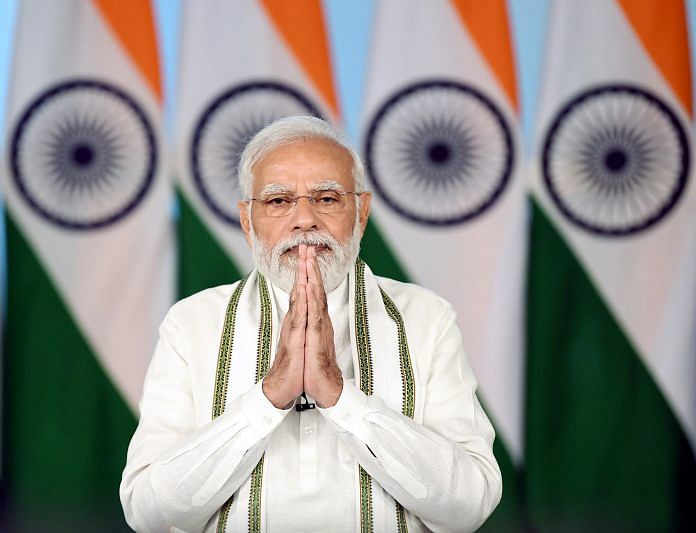Ever since PM Modi’s ‘revdi’ remark, the idea of the Indian welfare state has been the talk of the town. The ‘freebie’ debate, as it has come to be called, is not only important because of its political underpinnings, but also because of its affirmation of the logic of the kind of democracy we are. It has correctly been argued that the reason freebies are a point of contention in democratic politics is because popular economic distress is becoming a lever democratic bargaining. As Yamini Aiyar put it recently, it is simply democratic politics responding to the needs of the voter. If the state has failed to provide the kind of economic development the citizen needed, how can the PM blame the avenue which articulates (or manifests) the citizen’s concern? To blame this as an example of voters being ‘bought’ is to simply miss the crux of the situation.
The entire issue of freebies boils down to a clash of differing perceptions of welfare. The UPA version of welfare schemes was rooted in a rights based framework. The Right To Information and MGNREGA, for instance, were examples of a notion of empowerment where the citizen could actively demand rights from the state. There is a nuanced twist to the kind of empowerment the NDA are delivering with what they call the labharthi varg. Their notion of welfare posits the creation of the citizen as a beneficiary beholden to a ‘charitable state’, as opposed to a citizen actively claiming rights from the state. This state basically offers benefits to citizens as acts of benevolence and generosity to bargain with them in the realm of competitive electoral politics, thereby limiting the citizen-state compact to the provision of benefits. Rajeev Bhargava takes this logic further and argues that this transition to a ‘passive citizen’ is actually a return of political subjugation. It is a step towards creating what he calls ‘political subjects’, thereby making the idea of citizenship redundant. We hence see this facet of the NDA variant of welfarism as the creation of a ‘passive’ citizen.
There is an alternate view of looking at this ‘new welfarism’, one which projects it as an indigenous package of atma-nirbharta. Shashi Tharoor perceptively discerned between public goods (health care, education, etc) and private goods (gas cylinders, pipelines, et al) to point out how this ‘new welfarism’ only takes credit for the latter. The ‘subsidised public provisioning of private goods’’is touted as a path to individual self-sufficiency. The labharthi varg has been distinct from the ordinary politics of caste and identity, and has positioned the citizen as an active participant in his own empowerment (‘we make toilets, you maintain them’), making welfare remarkably neo-liberal as opposed to its ossified leftist connotation. The idea is to hyphenate welfare with citizen obligation. Hilal Ahmed calls it the ‘responsive government, responsive citizens’ thesis. It sounds like fairly salient, and I daresay healthy, democratic logic. Hence the same idea of welfare is creating an ‘active’ citizen too!
In context of this second ‘active’ dimension, PM Modi derided the idea of freebies because they promulgate a culture where the citizen is a passive receiver of benefits. In other words, Mr Modi is creating an active citizen and a passive citizen at the same time! The citizen in the PM’s formulation is active in the realm of obligations/duties which are attached to the idea of the labharthi (as illustrated above). Yet, the notion of empowerment is crafted in a way that prevents a conversation on rights and identity (as it normatively ought to)—since the labarthi varg has been separated from caste and identity politics which are based on individual and community identity assertion. By not making the discursive space for this conversation, PM Modi is also asking that same citizen to be passive in the assertion of his rights.
Also read: In the debate over freebies, India is forgetting it traded rule of law for welfare services
An alternative
The idea of an ‘active’ citizen, however, extends beyond the arena of welfare. Another area where the BJP is inculcating ‘active’ citizenship is actually the realm of identity. Consider for instance, the ideological calls for the ‘expiation’ of past historical wrongs and reclaiming the vision of a glorious past peopled by ‘Hindus’ as opposed to ‘invaders’ and ‘marauders’. When the ideology of the ruling party crafts a citizen proactively calling for redressal of past injustices, the citizen is being groomed to be ‘active’ in propagating a narrower identity.
In the light of NDA’s current version of welfarism in the prism of its politics has exposed a discrepancy between two types of citizens—the ‘active’ and the ‘passive’. The question for policy makers is— can there really be one welfare state and two kinds of citizens? An answer to this question may well decide the future of the freebie debate.
The author is a student at Kirrori Mal College, University of Delhi. Views are personal



